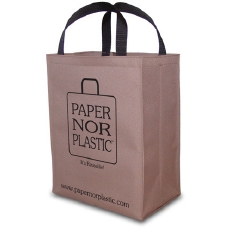Paper nor plastic
October 5th, 2007 Posted in green living, paper, plastic, reusing | 1 Comment » Make sure you like EcoJoes on Facebook to stay updated on green ways to save money and help the environment. Just click the "like" button below. Muchas gracias!“Paper or plastic?” It’s an age-old question that has haunted people since the dawn of time, if not longer. Some people get paper bags for their strength. Others get plastic bags for the fun handles. But if you’re trying to lower your eco-footprint, then you are basing this decision on its environmental impact. cheap nfl jerseys Hopefully, this here will help you make your decision.
Consumption:
Paper Bags: American use over 10 billion paper Italia bags each year. Around 14 million trees are chopped down each year for paper bag wholesale jerseys production.
Plastic Bags: If you thought 10 billion was a lot, how about this: around 100 billion plastic bags are used in America each year. That takes about 12 million barrels of oil annually, just for bags. Dang.
Production:
It takes close to 4 times as much energy to make wholesale mlb jerseys a paper bag compared to a plastic bag. But, plastic winter bags are made from oil (non-renewable resource), while paper bags are made from trees (renewable resource).
 Pollution:
Pollution:
Paper Bags: Toxic chemicals used in paper bag production (like bleach and acid) contribute to water pollution and air pollution (acid rain). Surprisingly, paper bag production generates 70 percent more air pollution and 50 times more water pollution than plastic bags.
Plastic Bags: Plastic bag production requires hazardous chemicals also. According to an EPA ranking of chemicals that generate the most hazardous waste, 5 of the top 6 chemicals are used in plastics production. Plus, hundreds of thousands sea animals die each year from eating plastic bags, which clog their New digestive tracts or choke them.
Recycling:
Paper Bags: Lots of chemicals have to be used to recycle paper bags. Once a bag is wholesale nba jerseys recycled, it’s more likely to be used to make cardboard than another paper bag.
Plastic Bags: A lower percentage of plastic bags than paper bags are recycled. Increasingly, plastic bags collected for recycling are instead sent to countries such as China and India, where they can be cheaply burned due to weak environmental laws. Good ol’ India and China.
Biodegradable:
Paper Bags: Paper bags do break down after a Wholesale Nike San Francisco 49ers Jerseys while, but not if they’re in a modern landfill. In that case, 95 percent of the garbage is buried under layers Krimskrams! of soil, so air and sunlight can’t reach the bags to decompose them. So they just sort of sit there.
Plastic Bags: They don’t break down.
My Conclusion:
 Use a reusable bag. Keep a cloth bag in “clase your car, and just use that whenever you go shopping for something. When I worked at Fresh Market in Asheville, plenty of people came through with cloth bags. These bags can hold more than paper or plastic bags, they’re stronger, and you don’t end up getting a bunch of disposable bags that will clutter up your house. Plus, you can get bags with jawsome designs or slogans on the side, which makes you cooler than Quiz them My people that are using plain ol’ plastic or paper bags, thus bolstering your poor self-esteem.  And that is what really matters.
Use a reusable bag. Keep a cloth bag in “clase your car, and just use that whenever you go shopping for something. When I worked at Fresh Market in Asheville, plenty of people came through with cloth bags. These bags can hold more than paper or plastic bags, they’re stronger, and you don’t end up getting a bunch of disposable bags that will clutter up your house. Plus, you can get bags with jawsome designs or slogans on the side, which makes you cooler than Quiz them My people that are using plain ol’ plastic or paper bags, thus bolstering your poor self-esteem.  And that is what really matters.